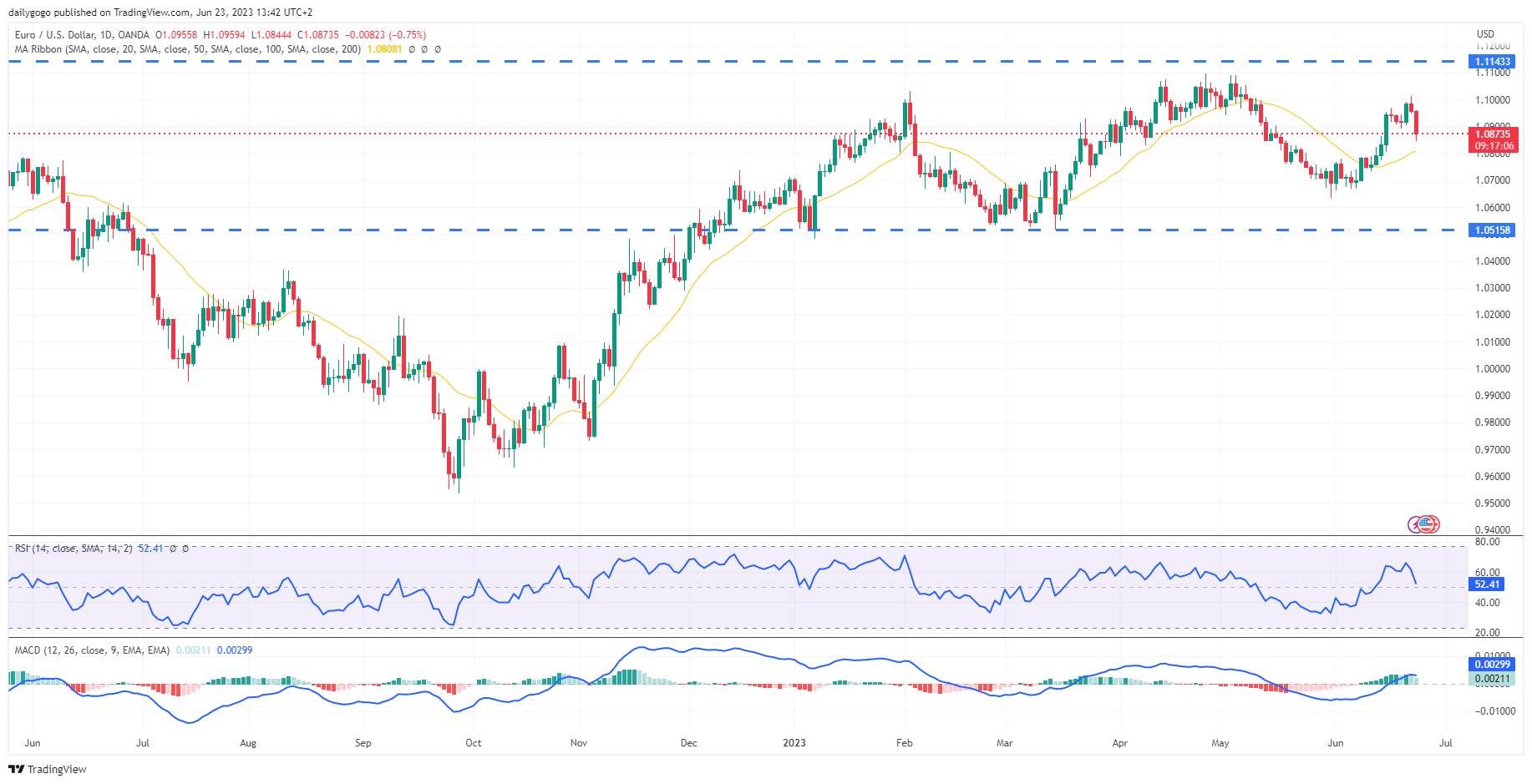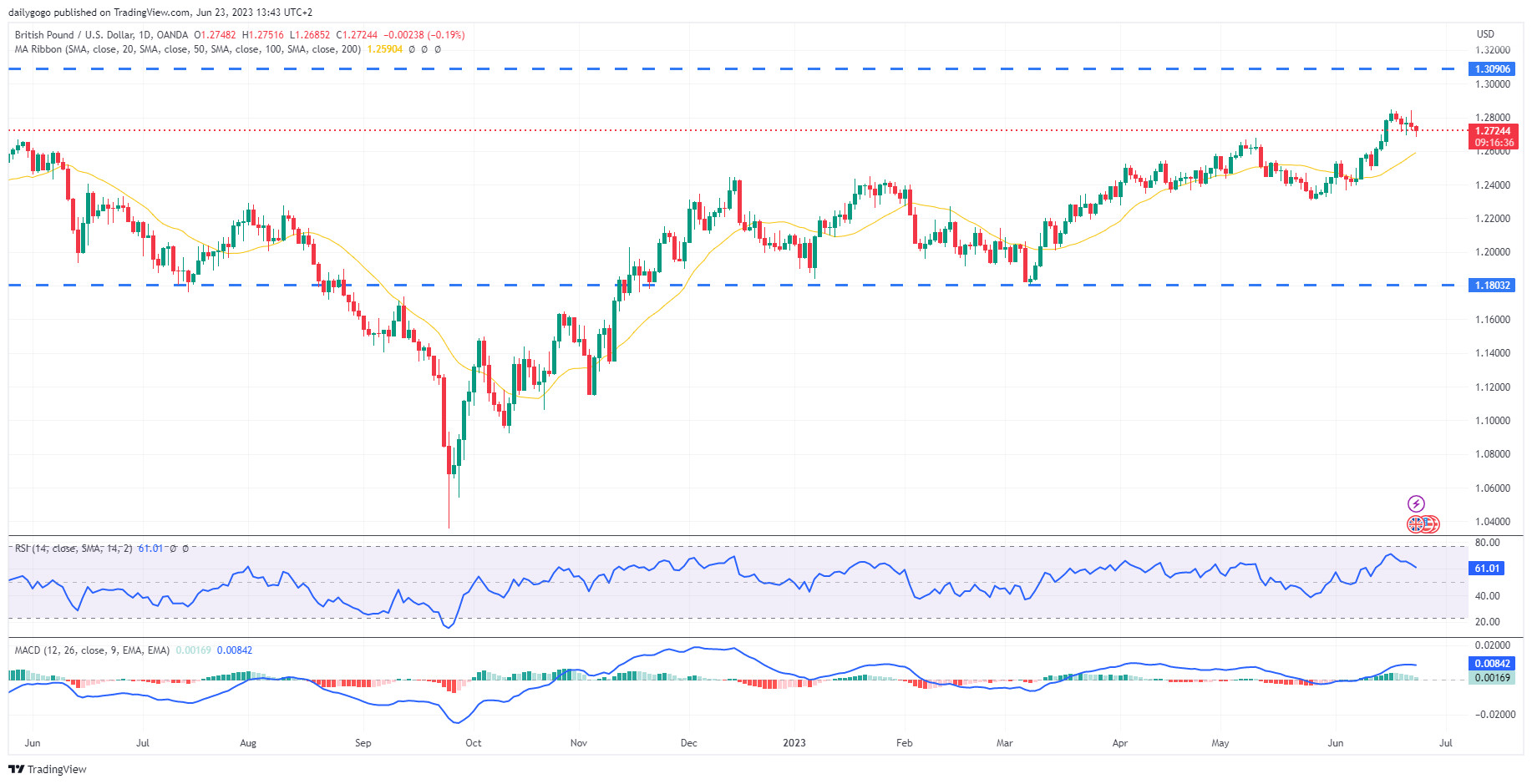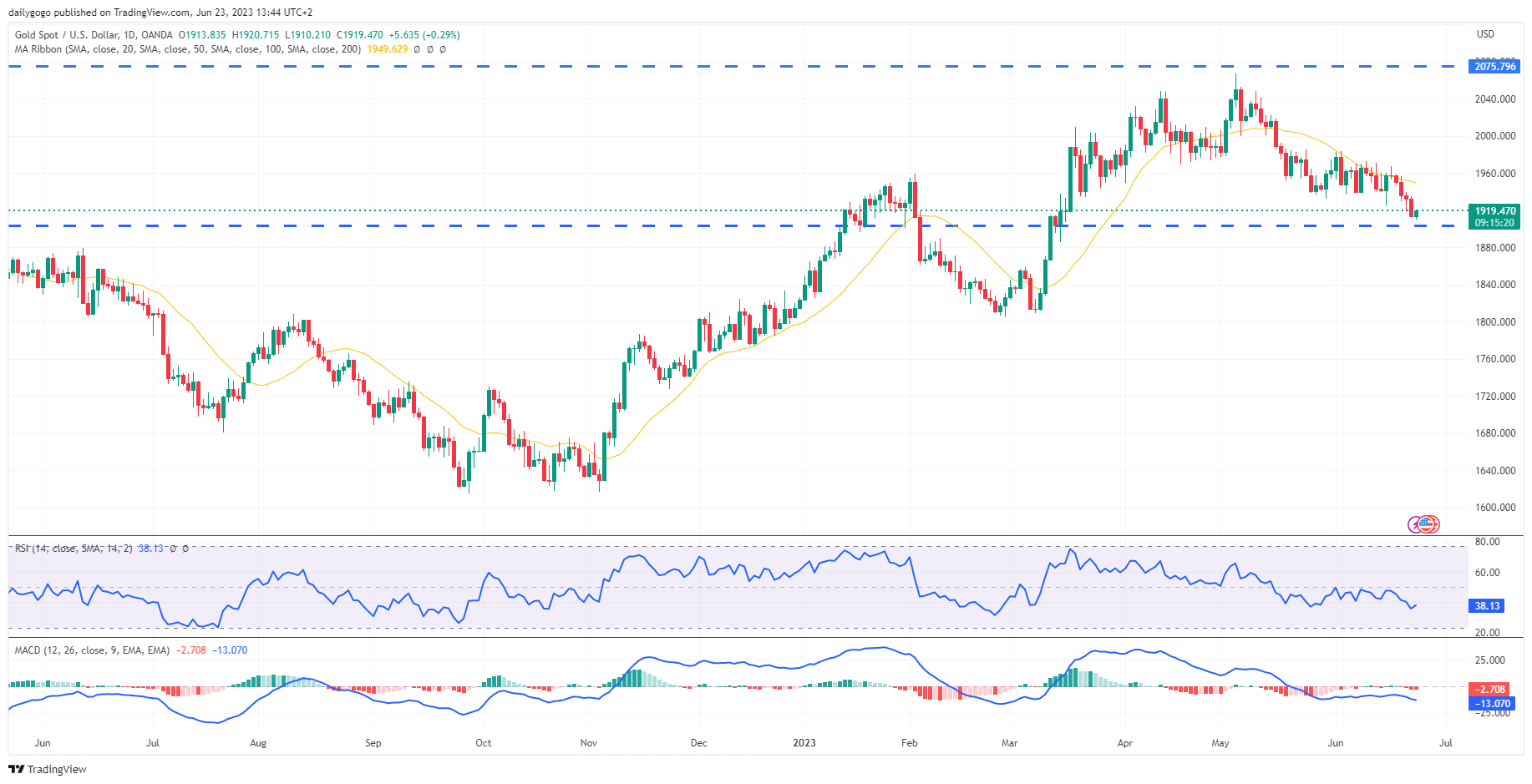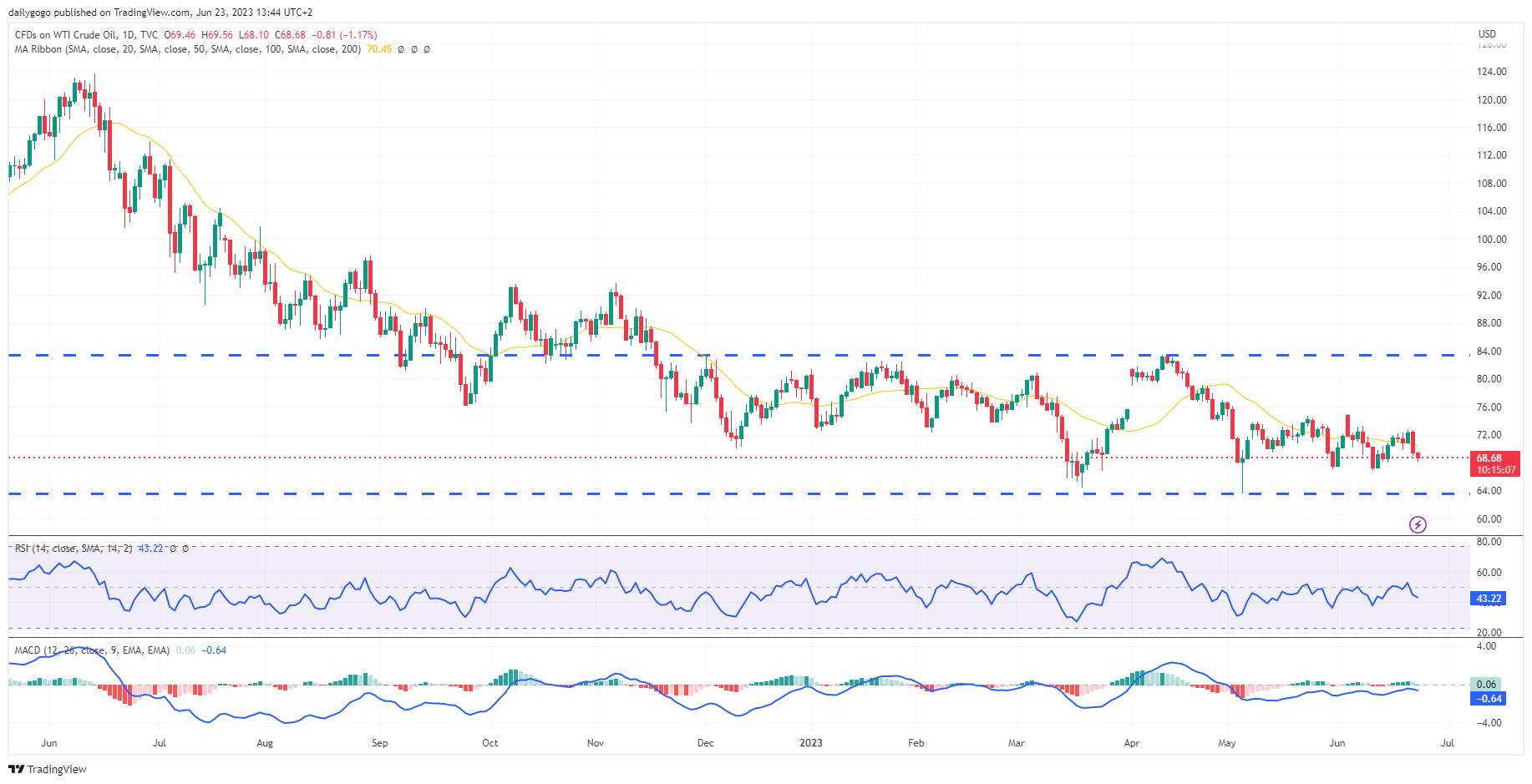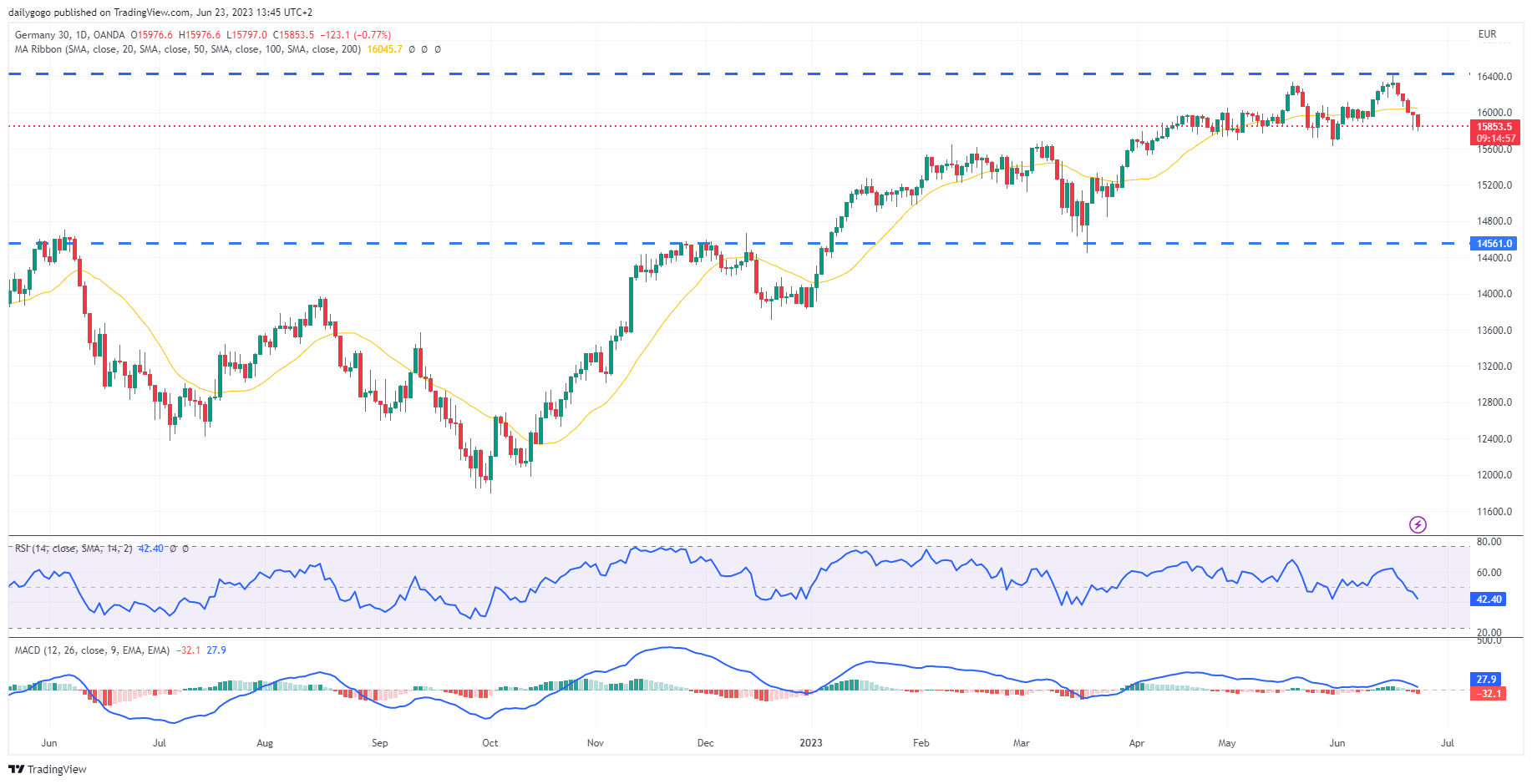EURUSD
- Euro slips 0.3% against the US dollar in early European trade, trading at 1.0930 ahead of the release of purchasing managers' index surveys.
- Market anticipates a softening in activity, but solid PMI numbers could potentially weigh on the euro, suggesting higher interest rates in a region that recently faced a recession in Q1.
- The US dollar gains 0.3% against a basket of currencies, including the euro, amid risk aversion triggered by more aggressive monetary tightening by central banks.
- Federal Reserve Chair Jerome Powell reiterates the possibility of at least two more rate hikes this year to contain high inflation, providing support for the US dollar.
- GBP/USD falls 0.3% as the Bank of England's larger-than-expected rate hike raises concerns of a potential economic slowdown, pushing some investors towards safe-haven assets like the US dollar.
Closing statement: The euro faces downward pressure against the US dollar amidst expectations of a slowdown and potential rate hikes in the eurozone, while the US dollar gains strength from monetary tightening measures and risk aversion.
GBPUSD
- GBP/USD falls 0.3% to 1.2706 after an initial jump in response to the Bank of England's larger-than-expected rate hike of 50 basis points, which raised concerns of a potential economic slowdown.
- Market sentiment suggests that the Bank of England's willingness to engineer a harder slowdown to control inflation has weighed on sterling, as it is perceived as bad news for the growth-sensitive currency.
- Higher interest rates, although typically supportive of currencies, have raised the risk of a recession in the UK, leading some investors to seek safe-haven assets like the US dollar.
- UK retail sales data released earlier shows a 2.1% annual decline in May, further indicating an economic slowdown.
- The US dollar gains strength as more central banks, including the Bank of England, adopt aggressive monetary tightening measures, prompting risk aversion and driving investors towards the US dollar.
| SMA (20) | Slightly Rising |
|
|
| RSI (14) | Slightly Falling | ||
| MACD (12, 26, 9) | Neutral |
Closing statement: GBP/USD faces downward pressure as the Bank of England's rate hike and concerns of an economic slowdown weigh on the pound, while the US dollar gains support from its safe-haven status amid a bout of risk aversion.
GOLD
- Gold prices edge lower and are on track for their worst week since January, as concerns of tighter monetary conditions rise due to a substantial rate hike from the Bank of England and hawkish signals from the Federal Reserve.
- Spot gold trades at a three-month low, breaking out of a previous tight trading range to the downside.
- The Bank of England's larger-than-expected rate hike of 50 basis points, driven by overheated inflation in the UK, contributes to the decline in gold prices.
- Federal Reserve Chair Jerome Powell's testimony before Congress reinforces the possibility of at least two more rate hikes this year, with U.S. inflation remaining above the Fed's target range. Rising interest rates increase the opportunity cost of holding gold, dampening its appeal.
- Market expectations of a rate hike in July by the Fed, along with reduced bets on a rate cut this year, further impact gold prices negatively.
| SMA (20) | Slightly Falling | |||
| RSI (14) | Slightly Rising |
|
||
| MACD (12, 26, 9) | Slightly Falling |
Closing statement: Gold faces significant downward pressure as the Bank of England's rate hike and the hawkish outlook from the Federal Reserve raise concerns about tighter monetary conditions. The potential for rising interest rates and the inverse relationship between gold and the stock market contribute to the bearish sentiment in the gold market.
CRUDE OIL
- Oil prices dropped for a second day and were heading for a weekly decline due to concerns over economic growth outweighing signs of tighter supplies.
- The Bank of England's interest rate hike, along with rate hikes from central banks in Norway and Switzerland, added to concerns about economic growth and oil demand.
- The prospect of more U.S. interest rate hikes and a stronger dollar also weighed on oil prices, making oil more expensive for other currency holders.
- Despite signs of supply-side tightness such as a surprise decline in U.S. crude stocks and Saudi Arabia's production cut, recession and demand concerns overshadowed the market.
- Oil prices are expected to remain under pressure as central bank tightening raises fears of weakening global growth. The market will closely watch stockpile data and await easing measures from Beijing.
| SMA (20) | Slightly Falling | |||
| RSI (14) | Falling | |||
| MACD (12, 26, 9) | Slightly Falling |
Closing statement: While oil prices faced downward pressure due to economic uncertainties and interest rate hikes, positive inventory data and supply cuts may offer some support in the future.
DAX
- The DAX index dropped 0.7% as European shares dipped, reflecting a central bank policy-packed week and concerns over interest rate hikes and inflation.
- Shares of Siemens Energy plunged 31.6% after the company withdrew its annual profit outlook due to quality problems at its Siemens Gamesa wind turbine unit.
- The European oil & gas index slid 1.6%, while healthcare stocks saw gains of 1.1%.
- The basic resources index, the worst performer for the week, fell for the seventh straight session, tracking weekly declines of 6.8%.
- Economic data showed a slowdown in euro zone business growth, particularly in manufacturing, and contraction in French business activity.
| SMA (20) | Neutral | ||
| RSI (14) | Falling | ||
| MACD (12, 26, 9) | Slightly Falling |
Closing statement: The DAX index faces downward pressure amid concerns over interest rate hikes, inflation, and slowing economic activity. Support levels to watch are around the 15630-15700 range. The upcoming US PMI data will be important for further market direction.
